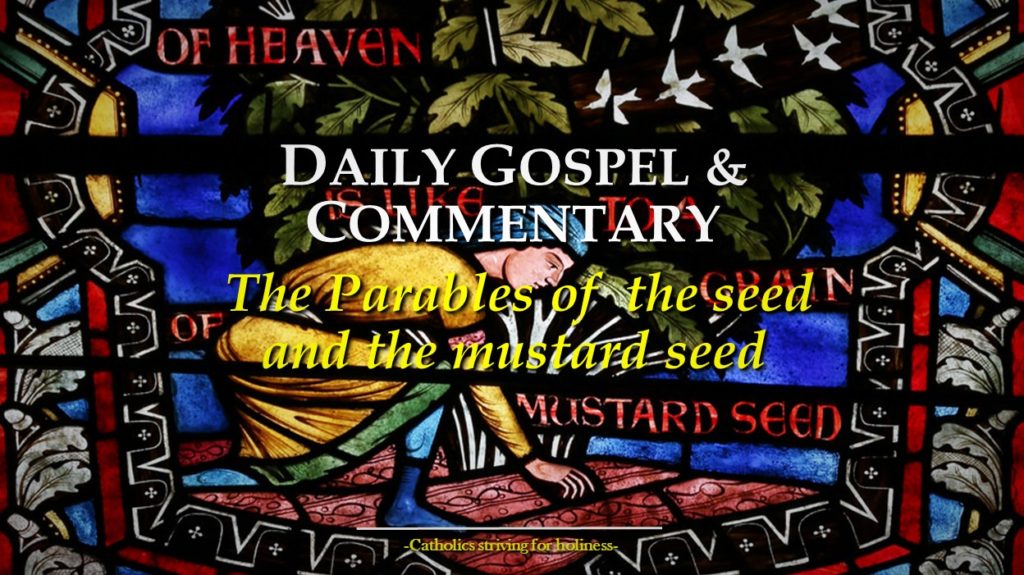DAILY GOSPEL
Friday, 3rd week of Ordinary Time.
Parables of the seed and the mustard seed
Mk 4:26–34
Jesus said to the crowds: “This is how it is with the Kingdom of God; it is as if a man were to scatter seed on the land and would sleep and rise night and day and the seed would sprout and grow, he knows not how. Of its own accord the land yields fruit, first the blade, then the ear, then the full grain in the ear. And when the grain is ripe, he wields the sickle at once, for the harvest has come.”
He said, “To what shall we compare the Kingdom of God, or what parable can we use for it? It is like a mustard seed that, when it is sown in the ground, is the smallest of all the seeds on the earth. But once it is sown, it springs up and becomes the largest of plants and puts forth large branches, so that the birds of the sky can dwell in its shade.” With many such parables he spoke the word to them as they were able to understand it. Without parables he did not speak to them, but to his own disciples he explained everything in private.
SHORT COMMENTARY
Jesus is telling his disciples about the Church (=Kingdom of God on earth which began tiny): the preaching of the Gospel, which is the generously sown seed, will unfailingly yield its fruit, independently of who sows or who reaps: it is God who gives the growth (cf. 1 Cor 3:5-9). By day and by night, the seed grows without the sower knowing how.
- The work of God is carried out notwithstanding human limitations. It has a force effective by itself. How is it possible for the Church to spread rapidly throughout the world through means which are so poor both from the personal and instrumental viewpoints? Where does her strength to resist and overcome such great persecutions as those that at first She suffered from the Jews, then from the Romans and now from so many enemies of the Gospel of Christ, come from?
- Saint Ambrose replies: “It is a normal thing that, in the middle of this hectic world, the Church of the Lord, built on the foundationn of the Apostles, remains stable and stands firm on this unbreakable base against the furious assaults of the sea (Mt. 16, 18) She is surrounded by the waves, but she does not wobble, and although the elements of this world reverberate with an immense clamor, she, nevertheless, offers those who are distressed the great security of a port of salvation ” (Letter 2, 1-2)
- And St. John Chrysostom: “The ship of Jesus can not sink … The waves do not break the rock, but they themselves become foam … Nothing is stronger than the Church .. It is useless to fight against heaven, God is always the strongest “(Homily before exile).
The Kingdom of God also refers to the action of grace in each soul. God silently works a transformation in us, counting on our correspondence, until we reach “maturity in Christ” (cf. Eph 4:13). Even though God expects us to do our part, the real initiative lies with Him, “because it is the Holy Spirit who, with his inspirations, gives a supernatural tone to our thoughts, desires and actions. It is he who leads us to receive Christ’s teaching and to assimilate it in a profound way. It is he who gives us the light by which we perceive our personal calling and the strength to carry out all that God expects of us. If we are docile to the Holy Spirit, the image of Christ will be found more and more fully in us, and we will be brought closer every day to God the Father. ‘For whoever are led by the Spirit of God, they are the children of God’ (Rom 8:14)” ( St. Josemaria Escrivá, Christ is passing by, 135).
SOURCE: http://w2.vatican.va/content/francesco/en/angelus/2015/documents/papa-francesco_angelus_20150614.html
